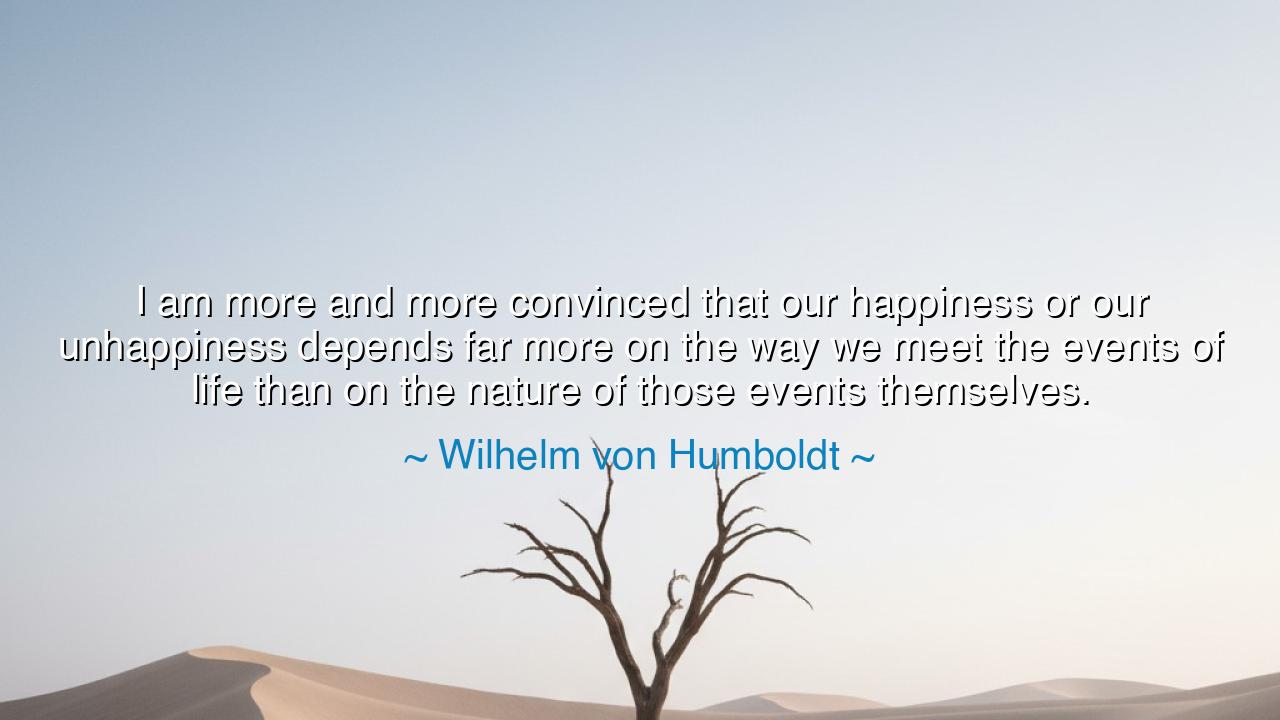
I am more and more convinced that our happiness or our
I am more and more convinced that our happiness or our unhappiness depends far more on the way we meet the events of life than on the nature of those events themselves.






“I am more and more convinced that our happiness or our unhappiness depends far more on the way we meet the events of life than on the nature of those events themselves.” Thus spoke Wilhelm von Humboldt, the great Prussian scholar, philosopher, and humanist whose words echo across the centuries like a bell of truth. In this single sentence lies a wisdom older than stone, yet ever new: that happiness is not shaped by what happens to us, but by how we choose to respond. It is a truth both liberating and humbling, for it returns the power of life to where it belongs—not in the hands of fate, but within the human soul.
The origin of this quote lies in the heart of Humboldt’s philosophy, a vision that sought to harmonize inner freedom with outer reality. Living during an age of revolution, war, and social transformation, he saw clearly that no person could control the shifting tides of history. What one could control, however, was one’s response to those tides—the steadiness of mind, the dignity of spirit, and the resilience of heart with which one met them. Thus, Humboldt’s words arise not from idle reflection, but from the crucible of experience. He understood that suffering and joy are not born of circumstance, but of perception—that the quality of life depends less on the nature of events and more on the mind that confronts them.
The ancients, too, spoke this truth. Epictetus, the Stoic sage, declared that men are not disturbed by things, but by the opinions they form of them. The storm, he said, does not ruin the sailor—it is the sailor’s fear that does. So it is with every event of life: the world throws at us wind, fire, and darkness, but it is our attitude that turns these trials into either torment or triumph. Humboldt’s insight thus joins the chorus of those who have seen that true mastery is self-mastery—that the noblest victory is not over others, but over oneself.
Consider the story of Viktor Frankl, the psychologist and survivor of the Nazi concentration camps. In that hell of cruelty and despair, he witnessed men stripped of every possession, every freedom, and every illusion. Yet he discovered one power that could not be taken—the power to choose one’s attitude. Even in chains, Frankl found meaning in his suffering; he transformed horror into insight and pain into purpose. Like Humboldt, he learned that the way we meet life’s events determines the measure of our happiness, even in the darkest hour. His endurance was not a miracle of circumstance, but of will—a living proof that the soul is mightier than fate.
Humboldt’s wisdom asks of us great courage—for it demands that we cease blaming the world for our misery. It calls us to look inward, to take responsibility for the spirit with which we meet adversity. Life will always bring uncertainty: the loss of what we love, the failure of what we hoped, the aging of body, the changing of fortune. Yet none of these are our enemies unless we make them so. When we meet them with bitterness, they destroy us; when we meet them with patience and understanding, they refine us. The alchemy of the soul turns even grief into wisdom when the heart remains open.
The lesson, then, is this: happiness is not a gift, but a discipline. It is not granted by the world, but cultivated within the self. The wise do not wait for calm seas—they learn to steer through storms. Each event of life is a test of our inner balance, a chance to practice the art of acceptance, perspective, and gratitude. To meet hardship with dignity, to meet success with humility, to meet change with faith—these are the acts that shape a peaceful spirit. The world cannot promise us happiness, but we can promise it to ourselves by mastering the art of response.
To live by this teaching, begin each day by remembering your sovereignty. When misfortune comes, pause and say: “This too is part of the path. How shall I meet it?” When joy arrives, do not cling, but give thanks. When challenge looms, face it with courage, and when loss strikes, let compassion guide you. For as Humboldt teaches, your happiness or unhappiness depends not on the hands of fate, but on the choices of your own heart.
So remember, dear listener: life is not what happens, but what you become through it. Events will pass like waves across the shore, but your response—that is the eternal part of you. Let it be noble. Let it be calm. Let it be filled with wisdom. Then no storm shall shake your peace, no sorrow steal your joy, for you will have discovered what Humboldt knew—that the truest freedom, and the deepest happiness, begin within the mind that dares to meet life with grace.






AAdministratorAdministrator
Welcome, honored guests. Please leave a comment, we will respond soon